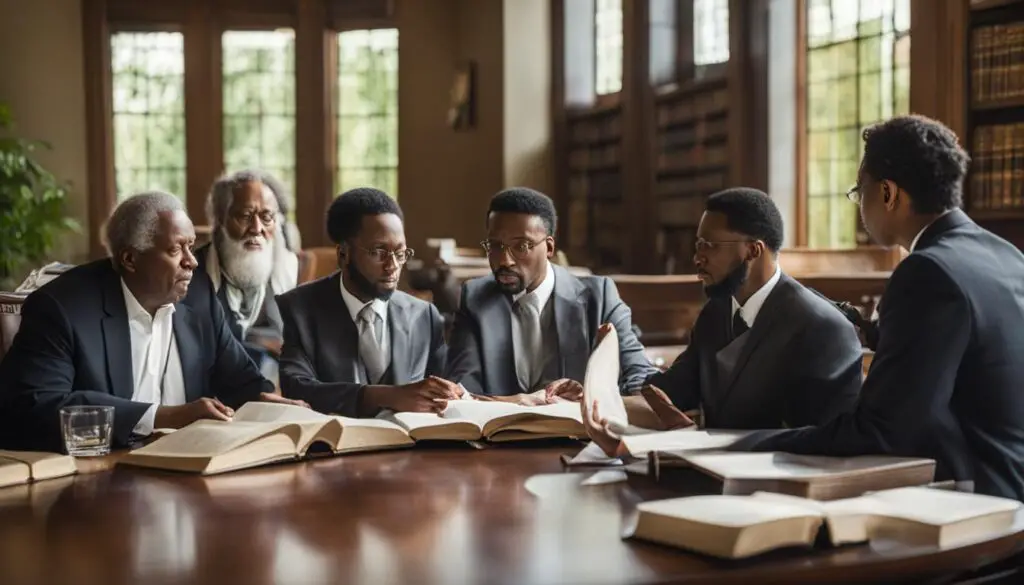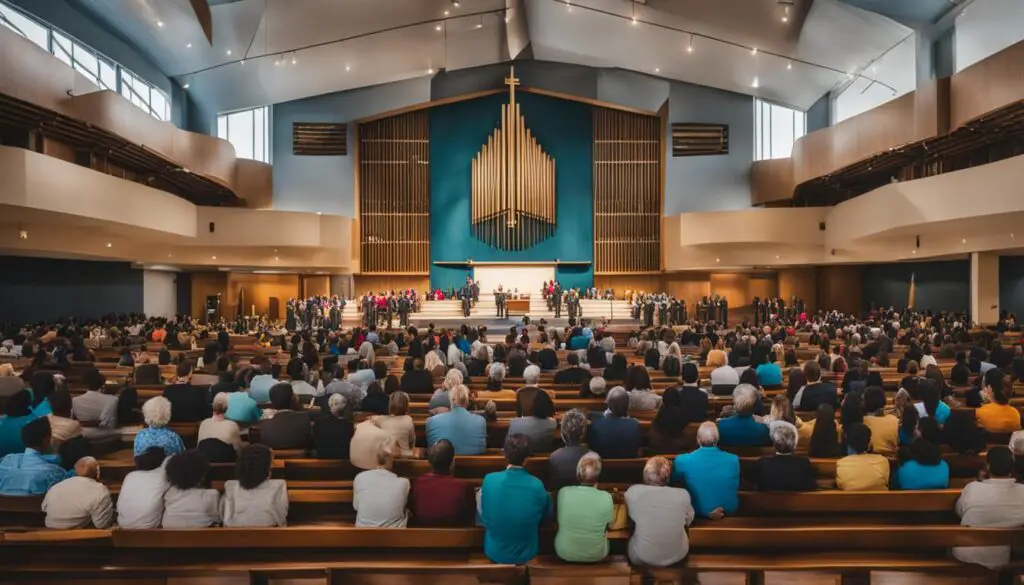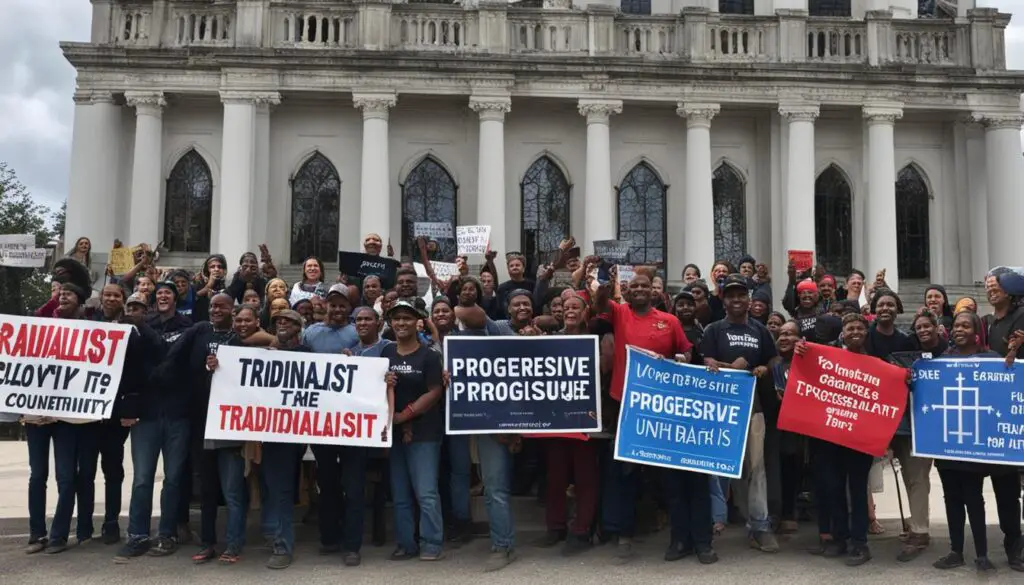Welcome to our comprehensive guide on understanding the biblical definition of the church. The church holds a significant place in the lives of believers, serving as the body of Christ, a testament to God’s love, and an essential part of their faith journey. In this article, we will explore the origins, nature, and role of the church according to the Bible, shedding light on its importance in today’s modern world.
Throughout the Bible, the church is described in various ways that highlight its significance. From being referred to as the body of Christ and His glorious temple to His adopted family, the church is a cherished and beloved entity. Its roots can be traced back to the Old Testament, but it truly flourishes and finds its purpose in the New Testament.
To gain a deeper understanding of the church, we will delve into the etymology of the word, exploring its origins in Hebrew and Greek. We will uncover how the concept of the church took shape throughout history, adapting to different cultural and societal contexts along the way.
As we explore the Bible verses that define the church, we will discover its multifaceted nature. Through these verses, we will come to understand the church as the body of Christ, the people of God, and the bride of Christ. Additionally, we will examine the vital role of faithful preaching, sacraments, and church discipline in shaping the church.
Delving into the historical context of the church, we will appreciate the challenges and triumphs it has faced throughout the centuries. From its humble beginnings, often meeting in homes and facing persecution, to the establishment of dedicated church buildings, the church’s journey through time reflects its resilience and adaptability.
What do scholars say about the church? We will explore the insights offered by theologians and researchers, gaining different perspectives on its nature and function. From ecclesiology to biblical exegesis, scholarly contributions contribute to our comprehensive understanding of the church.
The Bible is replete with stories that highlight the significance of the church. We will delve into these biblical narratives, examining the early Christian community, the establishment of church leaders, and the spread of the gospel through the efforts of believers. These stories serve as practical examples of how the church functioned in different contexts.
While the church is an integral institution, it is not exempt from pitfalls and errors. We will explore the right and wrong practices within the church, ensuring believers can discern and uphold biblical teachings while acknowledging historic and contemporary controversies.
Today, the church continues to play a vital role in the faith of believers, particularly in America. We will examine its role as a place of worship, fellowship, and ministry, as well as its engagement with contemporary issues and society at large.
Finally, we will address the diverse opinions and perspectives on the church among believers. We will emphasize the importance of recognizing and respecting these differences while maintaining unity based on essential truths.
Key Takeaways:
- Understanding the biblical definition of the church is essential for believers to grasp its significance and role in their faith journey.
- The church is described as the body of Christ, His glorious temple, and His adopted family in the Bible.
- The word “church” originates from the Greek word “ekklesia” and has its roots in the Hebrew word “qahal,” emphasizing the communal nature of the church.
- Biblical verses depict the church as the body of Christ, the people of God, and the bride of Christ, with adherence to God’s Word, sacraments, and church discipline.
- Understanding the historical context of the church helps us appreciate its journey and challenges throughout history.
The Etymology and Origins of the Church
The word “church” has its origins in the Greek word “ekklesia,” which means a gathering or assembly. In the Old Testament, the Hebrew word “qahal” was used to refer to the assembly of God’s people. These terms highlight the communal nature of the church as a gathering of believers.
The concept of the church can be traced back to the time of Adam and Eve, but it took shape more profoundly with the people of Israel and their covenant relationship with God. Throughout history, the etymology of the word has evolved, but its essence remains rooted in the idea of a community of believers.
“The church is not a building; it is a community of believers, a gathering of God’s people.”
Understanding the etymology and origins of the church helps us appreciate its rich history and significance within the broader context of faith. It underscores the idea that the church is not simply a physical structure but a living, breathing body of believers united by their shared faith and devotion to God.
Table: Etymology of the word “church”
| Language | Word | Meaning |
|---|---|---|
| Greek | ekklesia | Gathering or assembly |
| Hebrew | qahal | Assembly of God’s people |
The Church in the Bible Verses
The Bible provides a rich tapestry of verses that shed light on the multifaceted nature of the church. These biblical passages offer valuable insights into the definition of the church and its role in the lives of believers. Let’s explore some key verses that help us understand the church according to scripture.
The Body of Christ
One of the prominent metaphors used to describe the church is that of the body of Christ. In 1 Corinthians 12:27, it is written, “Now you are the body of Christ, and each one of you is a part of it.” This verse emphasizes the unity and interconnectedness of believers in Christ. Each member has a unique role and function within the body, working together to fulfill God’s purposes.
The People of God
Throughout the Bible, the church is referred to as the people of God. In 1 Peter 2:9, we read, “But you are a chosen people, a royal priesthood, a holy nation, God’s special possession, that you may declare the praises of him who called you out of darkness into his wonderful light.” This verse highlights the special relationship between God and His people, who are set apart to glorify Him and proclaim His goodness.
The Bride of Christ
An intimate and profound representation of the church is captured in the imagery of the bride of Christ. Ephesians 5:25-27 states, “Husbands, love your wives, just as Christ loved the church and gave himself up for her to make her holy, cleansing her by the washing with water through the word, and to present her to himself as a radiant church, without stain or wrinkle or any other blemish, but holy and blameless.” This passage portrays Christ’s sacrificial love for the church and His desire to present her as pure and spotless.
These are just a few examples of the many biblical verses that offer profound insights into the church’s definition and purpose. As we delve deeper into the scriptures, we gain a more comprehensive understanding of the church, its significance, and its role in the lives of believers.
The Church Back in the Day
In order to understand the church as it exists today, it is essential to examine its historical context and evolution over time. The early days of the church were marked by persecution, as believers faced challenges and hardships in practicing their faith. During this time, the church often met in homes, where small groups would gather to worship, study the scriptures, and support one another. These intimate gatherings fostered a sense of community and solidarity among believers, defining the church as a close-knit group united in their devotion to Christ.
As the church grew and gained recognition, dedicated church buildings began to emerge. These buildings provided a dedicated space for worship and allowed for larger congregations to come together. The construction of churches symbolized the church’s increasing influence and importance in society, serving as a physical representation of the faith and a place of refuge for believers.
“The church is not a building; it is the people who gather together to worship and serve God.”
The historical context of the church reveals both the challenges and triumphs it has experienced throughout the centuries. From its humble beginnings in the face of adversity to the establishment of grand structures, the church has continuously adapted to the cultural and societal norms of each era. By understanding the historical backdrop, we can appreciate the resilience and determination of those who came before us, laying the foundation for the church as we know it today.
Historical Overview
| Time Period | Main Events |
|---|---|
| Early Church (1st – 3rd century AD) | – Persecution of believers – Spread of Christianity – Establishment of church structures and hierarchy |
| Medieval Period (5th – 15th century AD) | – Influence of the Catholic Church – Rise of monasticism and religious orders – Crusades and religious conflicts |
| Reformation Era (16th century AD) | – Protestant Reformation – Emergence of various denominations – Translation of the Bible into vernacular languages |
| Modern Era (17th century AD – present) | – Global expansion of Christianity – Denominational diversification – Social and cultural shifts impacting the church |
Scholarly Perspectives on the Church
When it comes to understanding the nature and function of the church, scholars offer valuable insights through their theological perspectives and biblical exegesis. Through their research and academic pursuits, they contribute significantly to our overall understanding of the church. Let’s explore some key viewpoints from scholars:
Biblical Theology
One prominent approach taken by scholars is biblical theology, which seeks to understand the church’s definition and role based on the various passages in the Bible. These scholars analyze biblical texts to uncover the original meaning and context surrounding the church. By delving into the cultural and historical backgrounds, they provide valuable interpretations that shed light on the church’s purpose and place within the faith.
Ecclesiology
Another important perspective comes from the field of ecclesiology, the study of the church itself. Scholars specializing in this area explore the church’s nature, structure, and role within the broader theological framework. They examine concepts such as church governance, sacraments, and ministry to deepen our understanding of the church’s identity and mission.
These scholarly perspectives offer rich insights into the multifaceted nature of the church. By engaging with theologians’ research and theological analyses, believers can gain a deeper appreciation for the church’s significance and its role in their faith journey.

Table: Scholarly Perspectives on the Church
| Perspective | Description |
|---|---|
| Biblical Theology | Interprets the church’s definition and role based on biblical passages. |
| Ecclesiology | Studies the church’s nature, structure, and role within theological frameworks. |
Bible Stories That Highlight the Church
The Bible is replete with stories and narratives that exemplify the importance and role of the church in the lives of believers. These biblical narratives provide practical examples of how the church functioned in diverse contexts, offering valuable lessons for modern-day Christians.
One such story is the formation of the early Christian community in the book of Acts. After Jesus’ ascension, the disciples, filled with the Holy Spirit, established a vibrant community of believers who devoted themselves to the apostles’ teaching, fellowship, breaking of bread, and prayer. This early church demonstrated the essence of unity, love, and mutual support, serving as a testament to the transformative power of the gospel.
Another notable example can be found in the establishment of church leaders, such as Timothy and Titus. The apostle Paul, in his letters to these young pastors, provides valuable instructions on the qualifications and responsibilities of church leaders. These narratives emphasize the significance of sound leadership within the church and the need to equip and edify believers for effective ministry.
Furthermore, the spread of the gospel through the efforts of believers also highlights the church’s role in fulfilling the Great Commission. Stories like the conversion of the Ethiopian eunuch, the encounter between Philip and the Samaritans, and the missionary journeys of Paul demonstrate how the early church actively engaged in evangelism and disciple-making. These accounts serve as a call to believers today to participate wholeheartedly in sharing the good news and making disciples of all nations.
Examples of Bible Stories Highlighting the Church:
| Bible Story | Main Message |
|---|---|
| The Formation of the Early Christian Community | Unity, love, and mutual support are integral to the church’s identity. |
| Establishment of Church Leaders (Timothy and Titus) | Sound leadership and effective ministry are essential for the church’s growth and edification. |
| The Spread of the Gospel through Believers | Active participation in evangelism and disciple-making is the church’s mandate. |
These stories in the Bible not only provide historical accounts but also serve as timeless reminders of the church’s purpose and mission. As believers study and reflect on these narratives, they can gain insights and inspiration to help them navigate their own faith journey and contribute meaningfully to the church in today’s world.
The Church: Right and Wrong
The church, as a divinely instituted institution, plays a crucial role in the lives of believers. However, it is not exempt from potential pitfalls and errors in its practices. It is important for believers to discern and uphold biblical teachings while acknowledging these potential shortcomings. Let’s explore some common areas where the church may experience doctrinal errors and how adhering to biblical teachings can help address them.
Misinterpretation of Scripture
One of the primary sources of doctrinal errors in the church can be traced back to the misinterpretation of Scripture. The Bible is a complex and rich text, and it is essential to approach it with careful study and hermeneutical principles. Without a solid foundation in biblical teaching, it is easy for individuals or even entire congregations to misinterpret key doctrines and deviate from the true teachings of Scripture.
Legalism vs. Grace
Another area where the church may go astray is the balance between legalism and grace. Legalism refers to a strict adherence to religious laws and regulations, often leading to a judgmental and exclusionary mindset. On the other hand, an overemphasis on grace without considering the call to holiness can lead to moral laxity. Striking a balance between the two is crucial, understanding that God’s grace is freely given but also calls us to live in obedience to His Word.
Division and Disunity
Church history is marred with instances of division and disunity, where doctrinal differences and personal preferences have led to schisms. Disagreements over secondary issues can sometimes overshadow the central truths of the faith, causing fragmentation within the body of Christ. It is important for the church to recognize the importance of unity and prioritize the essentials of the Christian faith, while allowing for diversity in non-essential matters.
| Common Doctrinal Errors | Adhering to Biblical Teachings |
|---|---|
| False teachings and cults | Developing a solid foundation in biblical truth through diligent study and discernment. |
| Prosperity Gospel | Focusing on the true message of the Gospel, which calls for sacrificial love, service, and the pursuit of God’s kingdom. |
| Sexual immorality and abuse | Upholding the biblical teachings on sexual purity, accountability, and creating safe spaces for healing and restoration. |
| Inequality and discrimination | Embracing the biblical truth that all believers are equal in Christ and treating everyone with love, respect, and dignity. |
While no church is perfect, addressing these potential areas of error and returning to a foundation of biblical teachings can help ensure that the church remains faithful to its calling. By continually seeking the guidance of the Holy Spirit, the church can navigate through these challenges and be a beacon of light in a world that desperately needs the transformative power of the Gospel.
The Church in Today’s World
The church continues to play a significant role in modern faith, particularly in America. It serves as a place of worship, fellowship, and ministry for believers. In a world that often emphasizes individualism and materialism, the church provides a sense of community and spiritual guidance. It offers a space for believers to come together, celebrate their faith, and support one another in times of joy and struggle.
Today, the church is also actively engaged in addressing contemporary issues and making a positive impact on society. Many churches are involved in social justice initiatives, advocating for the marginalized, and responding to the needs of their local communities. They seek to live out the teachings of Jesus by promoting love, compassion, and justice in a world that is often divided and in turmoil.
Furthermore, the church’s role extends beyond its physical presence. In an age of technology and digital connectivity, churches have embraced online platforms to reach a wider audience and provide spiritual resources. Livestreamed services, online Bible studies, and virtual prayer groups have become commonplace, allowing individuals to participate in religious activities from the comfort of their own homes.
As the church continues to evolve and adapt to the changing needs of believers, its fundamental purpose remains unchanged: to be a beacon of hope, a source of spiritual nourishment, and a catalyst for positive transformation in the world.

Statistics: The Role of the Church in America
| Statistic | Data |
|---|---|
| Number of Churches in the US | 381,900 |
| Percentage of Americans Who Identify as Christians | 65% |
| Church Attendance Rate | 36% |
| Churches Engaged in Community Outreach Programs | 77% |
| Churches Providing Financial Support to Charitable Organizations | 85% |
These statistics illustrate the continued relevance and impact of the church in America. While church attendance rates may vary, the majority of Americans still identify as Christians, indicating a significant presence of faith communities across the country. Moreover, the high engagement of churches in community outreach programs and financial support for charitable organizations demonstrates their commitment to serving others and making a difference in society.
Different Opinions on the Church
The nature and function of the church have long been subjects of debate among believers, leading to different perspectives and diverse views. These differences can arise due to varying theological interpretations, cultural contexts, or personal experiences. While essential Christian doctrines unite believers, it is essential to acknowledge and respect the diverse opinions within the body of Christ.
One of the significant factors contributing to different opinions on the church is the interpretation of biblical passages. Scholars and theologians often hold varying views on the nature and structure of the church, leading to theological diversity within different denominations. Some emphasize the priesthood of all believers and the importance of individual spiritual growth, while others focus on hierarchical structures and sacraments.
“The Church is the gathering of believers, but its practices and organizational structure can vary significantly. While some emphasize communal worship and evangelism, others place greater importance on doctrinal purity and maintaining traditional practices.” – Dr. John Johnson, Theology Professor
The historical and cultural context also influences perspectives on the church. Different regions and time periods have witnessed unique challenges and controversies within the church, leading to varying practices and beliefs. For example, the Protestant Reformation in the 16th century brought about significant doctrinal changes and sparked debates on the church’s role in society.
Despite these diverse opinions, it is crucial for believers to maintain unity based on essential truths. While differences may exist in non-essential matters, such as worship styles or church governance, the core principles of love, faith in Jesus Christ, and the proclamation of the gospel remain central to the church’s identity and mission.
| Perspective | Description |
|---|---|
| Ecclesiology | The study of the church, its nature, structure, and function |
| Denominational Perspectives | Views influenced by specific church traditions and theological frameworks |
| Cultural Context | The impact of cultural values and norms on church practices and beliefs |
| Historical Factors | Events and controversies that have shaped church history and theology |
While the church controversies persist, believers can find common ground in their love for Christ and commitment to follow His teachings. Embracing diversity within the body of Christ enables believers to learn from one another and grow in their understanding of God’s purposes for the church.

Conclusion
In conclusion, understanding the bible definition of the church is crucial for believers to grasp its significance and role in their faith journey. The church is more than a building; it is a gathering of believers, the body of Christ, and a testament to God’s great love.
The biblical view of the church emphasizes its communal nature, rooted in both the Hebrew word “qahal” and the Greek word “ekklesia.” These terms highlight the church as an assembly of God’s people, called to worship, fellowship, and ministry.
Throughout the Bible, various verses shed light on the biblical concept of the church. It is described as the body of Christ, the people of God, and the bride of Christ. The church is also identified by its adherence to the faithful preaching of God’s Word, the proper administration of sacraments, and church discipline.
As believers explore the biblical origins, purpose, and role of the church, they gain a deeper appreciation for its place in their lives and the broader Christian community. The church remains a vital institution that continues to serve as a place of worship, fellowship, and ministry in today’s world.
FAQ
What is the biblical definition of the church?
The Bible describes the church as the body of Christ, His glorious temple, and His adopted family. It is the object of God’s great love and the recipient of His promises.
What is the origin of the word “church”?
The word “church” has its origins in the Greek word “ekklesia,” which means a gathering or assembly.
How is the church described in the Bible?
The church is described as the body of Christ, the people of God, and the bride of Christ. It is identified by its adherence to the faithful preaching of God’s Word, the proper administration of the sacraments, and church discipline.
How has the church evolved throughout history?
In its early days, the church faced persecution and often met in homes. Over time, dedicated church buildings were established.
What do scholars say about the church?
Scholars offer different perspectives on the nature and function of the church, contributing to a comprehensive understanding of it.
Are there stories in the Bible that highlight the importance of the church?
Yes, the Bible contains stories and narratives that illustrate the formation of the early Christian community, the establishment of church leaders, and the spread of the gospel through the efforts of believers.
Has the church made any mistakes or faced challenges?
Yes, throughout history, there have been instances of doctrinal deviations, moral failures, and divisions within the church.
What is the role of the church in today’s world?
The church serves as a place of worship, fellowship, and ministry for believers. It also engages with contemporary issues and seeks to make a positive impact on society.
Are there different opinions on the church?
Yes, there are diverse opinions and perspectives on the nature and function of the church among believers.







